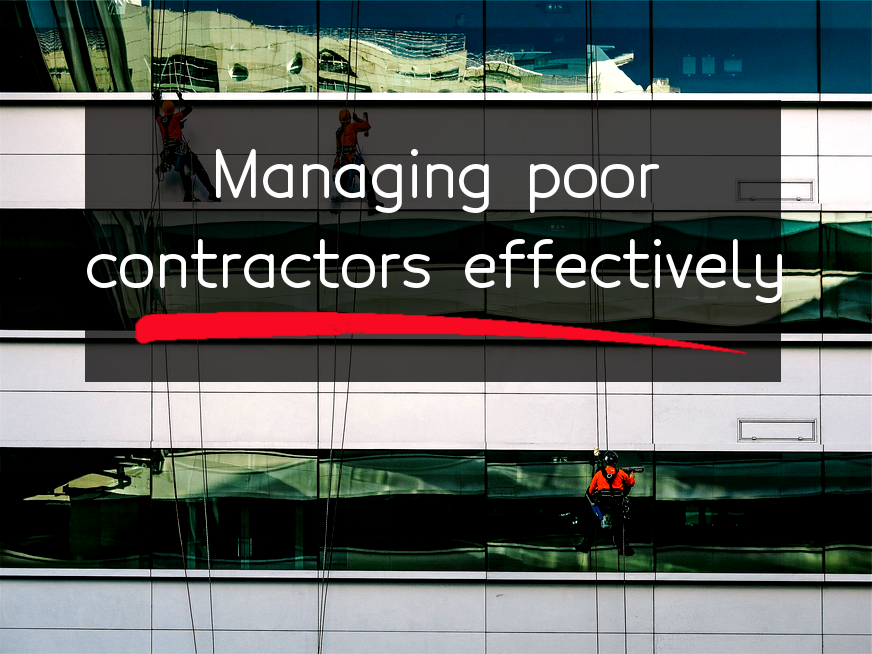Here is the general explanation on how to deal with bad contractors as a real estate investor:
Dealing with bad contractors can be a frustrating and expensive experience for real estate investors. Here are some tips on how to handle the situation:
- 1. Set expectations: Before hiring a contractor, make sure that you set clear expectations in writing. This should include deadlines, budget, and specific tasks.
- 2. Check references: Always check the contractor's references before hiring them. This will give you a good picture of their work ethic, quality, and reliability.
- 3. Communicate regularly: During the project, communicate with the contractor regularly. This will help you track progress and identify issues early on.
- 4. Pay in stages: Don't pay the contractor the entire amount upfront. Instead, pay in stages as tasks are completed. This will help focus the contractor's attention on meeting deadlines and completing work to a high standard.
- 5. Document everything: Keep a detailed record of all communications, receipts, and invoices related to the project. This will help you if you need to take legal action.
- 6. Address issues promptly: If you notice problems with the contractor's work, address them promptly. Waiting too long can make it harder to resolve the issue and may lead to additional expenses.
- 7. Seek legal advice: If the contractor's work is unsatisfactory, seek legal advice. This can help you understand your options and protect your rights as a real estate investor.
The Problem with Bad Contractors
Bad contractors can cause a variety of problems for their clients, including:
- 1. Poor quality work: Bad contractors may have poor workmanship and use low-quality materials, resulting in subpar results that need to be redone or repaired at a later date.
- 2. Delays and missed deadlines: A bad contractor may not have the necessary resources to complete projects promptly, leading to delayed projects that can become costly and cause frustration.
- 3. Increased costs: Projects with bad contractors may require additional spending due to unexpected expenses, mistakes, or extensive repairs, decreasing the return on investment.
- 4. Legal issues: Bad contractors may not follow building codes and regulations, leading to legal disputes, project shutdowns, fines, and even lawsuits.
- 5. Safety concerns: Bad contractors may not prioritize safety, exposing clients and anyone near the job site to dangerous health and safety hazards.
- 6. Reputation damage: With todays social media, bad reviews and negative feedback are easily shared, damaging the contractors reputation, which can hinder future business opportunities and partnerships.
How to Identify a Bad Contractor
But, in general, here are some steps to identify a bad contractor:
- 1Lack of Professionalism: A bad contractor may not take your project seriously or may not arrive on time for scheduled appointments.
- 2Unwillingness to Provide References: A good contractor will always provide references so that you can verify their work. If a contractor is unwilling to do so, it may indicate they have something to hide.
- 3No Contract: A contractor should always provide a written contract that outlines the scope of work, payment terms, and timelines. If there is no contract or it is not detailed, it may be a red flag.
- 4Pushy Sales Tactics: A bad contractor may try to pressure you into signing a contract or making a payment before you feel comfortable.
- 5No License or Insurance: A contractor should be licensed and insured in their trade. If they are not, it may indicate they are not qualified or experienced.
- 6No Written Estimates: A bad contractor may try to give you a verbal estimate that is not detailed or does not include materials, labor, and other costs.
- 7Poor Communication: If a contractor is not responsive to your calls, emails, or texts, it may indicate they are unreliable or unorganized.
- 8Low Bids: A bad contractor may offer a significantly lower bid than other contractors, which may reflect their lack of experience, knowledge, or intention to use substandard materials.
Steps to Take When Dealing with a Bad Contractor
Below are steps that one can take when dealing with a bad contractor in a professional manner:
- 1Communicate with the contractor: The first step is to talk to the contractor and bring up your concerns. Explain what exactly is not meeting your expectations and what changes you would like to see.
- 2Document everything: Make sure to document all conversations, agreements, and timelines in writing. This will come in handy in case of any legal disputes.
- 3Terminate the contract: If the contractor is not meeting your expectations even after numerous attempts to resolve the issues, consider terminating the contract. Make sure to follow all terms stated in the contract and discuss the termination with the contractor before implementing it.
- 4Get legal help: If the contractor has committed any violation or breach of contract, hire a lawyer and file a complaint. Keep all the documents and evidence ready to present in court.
- 5Leave a review: Leaving a review of your experience online can help other homeowners know what to expect when dealing with the contractor. Make sure to be objective and specific in your feedback.
It is advisable to do your research and interview several contractors before hiring one to ensure that you are working with a reputable and reliable contractor.
Document Everything
Documenting everything is important for several reasons:
- 1Accountability: When you document everything, you create a trail of evidence that can hold people accountable for their actions. Its harder for people to deny something happened or that they made a certain decision when there is documentation to support it.
- 2Transparency: Documentation provides a clear, concise, and complete record of what has happened. This makes it easier for others to understand whats going on and to make informed decisions.
- 3Consistency: Consistency is key to ensuring that policies and procedures are followed consistently across the organization. Documentation helps ensure that everyone is on the same page and understands whats expected of them.
- 4Legal protection: Documentation can also serve as evidence in legal proceedings. It can be used to support or refute claims made by individuals, as well as to provide proof of compliance with regulations and laws.
- 5Continuous improvement: Documentation allows you to identify areas where improvements can be made. By reviewing the documentation, you can see where processes are breaking down or where changes are necessary to improve efficiency or effectiveness.
Overall, documenting everything is important for ensuring accountability, transparency, consistency, legal protection, and continuous improvement within the organization.
Communicate in Writing
I can tell you why many people believe that communicating in writing is important:
- 1. Provides a permanent record: One of the primary advantages of written communication is that it provides a permanent record that can be revisited and referred to in the future. This can be important in business dealings or legal matters.
- 2. Clarity: When information is communicated in writing, it is possible to ensure that the message is clear and concise, without any misunderstandings.
- 3. Flexibility: The format of written communication can be adapted to suit different audiences and purposes, such as emails for quick communication or reports for more comprehensive coverage.
- 4. Professionalism: Written communication can often be seen as more professional and formal than verbal communication, making it suitable for business or academic purposes.
- 5. Accessibility: Written communication can be accessed and reviewed at any time, making it ideal for remote collaboration.
In summary, written communication is an integral part of many aspects of our lives, and the importance of communicating in writing cannot be overstated if we want to ensure that our message is clear, accurate, and accessible.
Just one more thing: if you liked the article, please like us on social media and share this article with friends.



